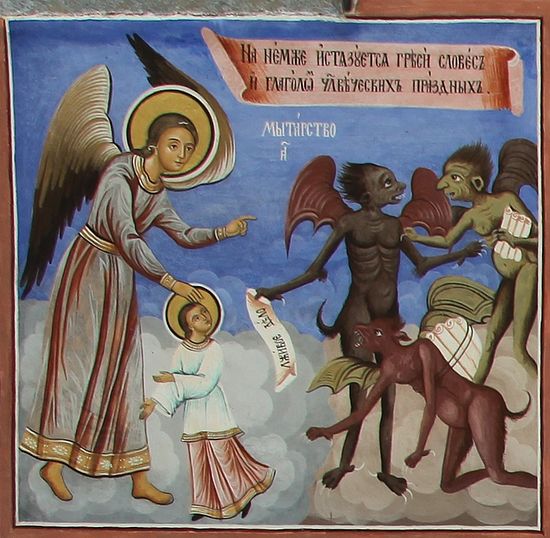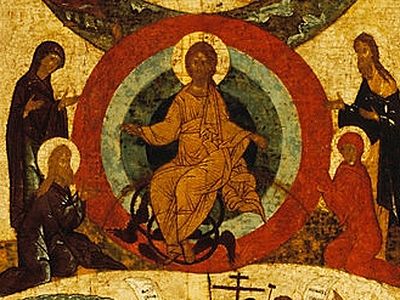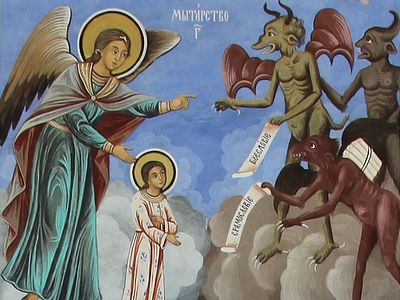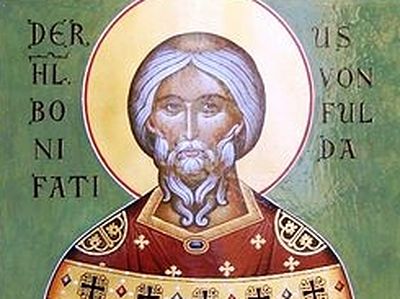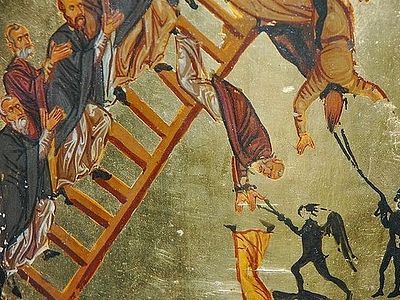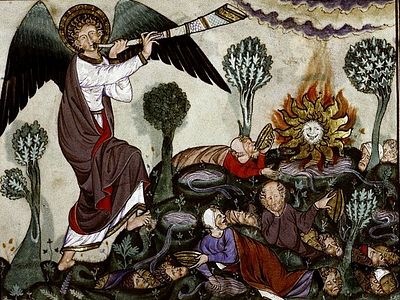Archpriest Oleg Stenyaev talks about the first of the tollhouses that the soul goes through after death; about how the words and speech of the Orthodox Christian should be, and; what sins bound up with words should we avoid.
“When we ascended from the earth to the heights of heaven, we were first met by the aerial spirits of the first tollhouse, at which the sins of idle talk are put on trial. Here we stopped. We were brought a multitude of scrolls, whereon were written all the words I had spoken from my youth without thinking, and especially the shameful ones,” Blessed Theodora describes the tollhouses.
It sometimes seems to the ordinary person that his life, deeds, and especially words concern only him and no one else. But the reality is rather different—we are surrounded by spirits: angels and demons. Whether we are vigilant or not, a spiritual battle is being waged for each of us that we cannot see. Even the most spiritually gifted could only permit themselves to say the following: For now we see through a glass, darkly; but then face to face: now I know in part; but then shall I know even as also I am known (1 Cor. 13:12). There also exist handwritings (Col. 2:14), and a book (Rev. 5:1; 20, 12), in which all our deeds and activities are written.
From the description of the tollhouses we see the scrolls written most likely at different times and during various conversations—a sort of devil’s chancery. There is no need to ascribe divine qualities to the demons and their princes—they are not omniscient and especially not omnipresent. Most likely they in fact keep a sort of “accounting” of our deeds and activities.
I seriously doubt that many of us have met the devil himself even once. Most often we attract the attention of some minor imps, depending on our sinfulness. For the devil himself our sins and iniquities are a kind of food, which feeds him and justifies the existence of low-ranking demons in the eyes of the prince of demons—who, in his turn, appears with these accounts before God Himself. It is written: Now there was a day when the sons of God came to present themselves before the Lord, and Satan came also among them. And the Lord said unto Satan, Whence comest thou? Then Satan answered the Lord, and said, From going to and fro in the earth, and from walking up and down in it (Job 1:6-7). That is, being a creature, satan has his place in time and space; and in order to see or know of something he has to be there. The demons constantly fight amongst themselves and cause each other harm, for they are entirely evil. In the Life of St. Niphont of Cyprus (commemorated December 23/January 5) it says:
The blessed one said to the evil demon: “Devil! Stop disturbing God’s servants! What good is it to you if this soul perishes?”
The demon answered, “We get no benefit from it, but we have an order from our king and princes who rule over us to struggle against people. If the princes learn that we are not struggling against people, they beat us cruelly.”1
But let’s return to the first tollhouse. Here are presented to us such sins of ours as:
1. Idle talk;
2. Blasphemous words;
3. Idle laughter;
4. Shameful songs;
5. Idle conversations.
What Theodora admits draws our attention: She “did not consider it a sin at all, and therefore she did not confess it to her spiritual father.” Here we find the answer to why a Christian can be detained at one of the tollhouses: Because he did not have recourse to the saving sacraments of the Church and put himself at the moment of death in a difficult position. Further on we will see that the Church’s Sacraments iron out all the demon’s compromising material that they have collected on us.
Theodora expresses her perplexity: “I was surprised,” she says, “at how they forgot nothing. After all, so many years have gone by, and I myself forgot them long ago.”
It is said, But I say unto you, That every idle word that men shall speak, they shall give account thereof in the day of judgment. For by thy words thou shalt be justified, and by thy words thou shalt be condemned (Matt. 12:36-37). The tollhouses are a preliminary investigation before the personal judgment, after which on the fortieth day after death the preliminary sentence is pronounced. The final sentence will be pronounced only when the soul returns to the body—at the Last Judgment.
When a person comes to the first tollhouse he probably has the feeling that he has found himself in a wild discotheque, because everyone there is making noise, shouting, and screaming. Bad thoughts and words, profanities, and shameful songs insistently creep into the head and sound there. All of this immediately comes to life, as if materializes. In Psalm 33 it is said, Keep thy tongue from evil, and thy lips from speaking guile (Ps. 33:14). It will be especially terrible and serious for blasphemers; punishment begins for them while yet in this life.
“One pious man who had a special love for Great Martyr Artemius took a candle and oil and went to his relics. Along the way he met one of his acquaintances, who mockingly asked him, ‘My friend, where are you taking those candles and oil?’ ‘I am going to pray to St. Artemius,’ was his answer. ‘Don’t forget, friend, to catch an illness from him and bring it back here when you return.’ The man going to the great martyr did not respond to the mockery, and after praying at the holy relics he went home. And what you do think happened? On his way back he really did catch a cruel illness—he felt unendurable pain in his body, which began swelling in places, and he wasn’t in a condition to reach his home. Because the house of the mocker stood along the way, he had no other choice but to make his way there. And as he arrived there he felt his illness getting worse and worse. He was stricken with something like demonic possession—his tongue went numb, and the illness seemed to be fatal. Nevertheless, after some time he came to himself, and supposing that the illness happened because of the mocker, he said, ‘What am I suffering for? Could it be from the words of my friend?’ The latter only began reproaching the sick man and mocked him again. The situation between them escalated to an open argument, so that many stopped and asked them about the reason for their fight. The sick man told them about his meeting with his friend on the road to St. Artemius and about his blasphemy, and after saying that immediately felt completely healthy. But, O the horror! His sickness instantly transferred to the blasphemer, who began shouting, ‘Woe is me! Woe is me!’ Those present were horrified at the sight, and glorifying God and His saint, said, ‘Righteous is God’s judgment! Thou who didst seek hast found, and may others learn a lesson not to listen to blasphemy and mockery of miracles that come from God and his saints.’”2
St. Basil the Great taught: “One should not say idle words, from which there is no benefit whatsoever. For saying or doing even something good that is not constructive for the faith means offending the Holy Spirit of God.”3 That is, a Christian accepts the possibility of speaking like the “very Logos” (St. Justin the Philosopher) and strives not to speak empty, idle, and “corrupt” words with the same tongue he uses to pray, witnesses to God, and lauds Him. The words, “saying or doing even something good that is not constructive for the faith means offending the Holy Spirit of God,” mean that from words arise intentions; or more precisely, intentions are expressed in words. From intentions in turn come deeds; and thus, as we speak, so do we act. It is said, For in many things we offend all. If any man offend not in word, the same is a perfect man, and able also to bridle the whole body (Jas. 3:2). Another meaning of these words, “saying or doing even something good that is not constructive for the faith means offending the Holy Spirit of God,” is that everything that is not in God’s name is either for the sake of vainglory or an evil plan. Such “good”, which “is not constructive for faith”, is a pitfall for Christians of little experience. Therefore it has been said, Even so the tongue is a little member, and boasteth great things. Behold, how great a matter a little fire kindleth! And the tongue is a fire, a world of iniquity: so is the tongue among our members, that it defileth the whole body, and setteth on fire the course of nature; and it is set on fire of hell (Jas. 3:5-6).
St. Isaiah the Hermit taught, “Do not be ashamed in the face of an idle talker and out of fear of offending him suffer him to say something indecent to you.”4 Keep your distance from those who talk too much; they weave a net, but we don’t know for what.
St. Mark the Ascetic would say, “Do not desire to hear about others’ evils, because when we do that, the traits of these evils are written also on us.”5 And truly! When we talk about others’ sins, gossip, and gloat, then God will definitely allow us to fall into something similar.
One priest whom I know very well related:
“Once I heard on the radio the song by Boris Moiseyev, ‘Blue moon’. I am a normal person, I have a wife and three children. But all day this song replayed in my head with the singer’s particular intonation: ‘Blue moon! Bl-uu-ue moon!’ This went on in the church and at home, and I had come to despair.”
I advised my brother to sing to himself the song, “God preserve the Tsar”. This melody helped him, and “Blue moon” went away.
The demons at the tollhouses do not demand from people what doesn’t belong to them, the demons. We are talking about sins, vices, and crimes; and if a person in his lifetime identified himself with all these, then the demons view such a person as their prize. But if the man repudiated sin before the moment of death, then he has nothing to fear at the tollhouses. The ladder from earth to heaven is not some demonic “elevator” that they can stop wherever they want. To the contrary, let us recall: And he dreamed, and behold a ladder set up on the earth, and the top of it reached to heaven: and behold the angels of God ascending and descending on it. And, behold, the Lord stood above it, and said, I am the Lord God of Abraham thy father, and the God of Isaac: [fear not]… (Gen. 28:12-13). That is how this ladder is depicted on Orthodox icons: At the top the Lord sits or stands, and angels help the souls ascend it. And although this divine call to “fear not” testifies to a certain danger, the soul that has succeeded in making peace with God before the moment of death risks nothing and freely ascends to Heaven. The demonic “tax collectors” are more of an incidental element close to such an important and responsible place for ascending into the Kingdom of Heaven as Jacob’s Ladder. But since man is given free will, he has the right not only to ascend, but also to fall from the spiritual world; and this justifies the presence of the demons here—like the presence of satan on the day when the sons of God came to present themselves before the Lord (Job 1:6).
The apostle Paul in his epistle to the Ephesians writes, Let no corrupt communication proceed out of your mouth, but that which is good to the use of edifying, that it may minister grace unto the hearers (Eph. 4:29).
One day a young man who had recently married came to our church. He said, “I don’t know what’s happened to my wife—she’s become introverted, and doesn’t talk to me at all.”
I asked him to bring his wife to church. When the three of us met, and I asked, “What happened?” she didn’t resolve to tell me right away. But then she related: “It was just like always. My husband came home from work, I made dinner, and set the table. He sat on the sofa, looked at me as I ran here and there, then suddenly said, “What a slob you are.”
Her husband pronounced the words, then immediately forgot them. But his wife didn’t.
“We drive together, and in my head the words are spinning around: “What a slob you are,” the young woman admitted. “We go to pray, and these words are in my head.”
Corrupt words can sow a storm of negative emotions in a person’s soul and disrupt the spiritual order in the life of a family.
Do you hear the apostle Paul’s call? Let no corrupt communication proceed out of your mouth. Truly, Christians sometimes allow themselves to say corrupt words. One philologist I know who studies among others things Russian curse words told me that these words are largely of Turkish origin. These are the words that the Mongols shouted when they stormed our fortresses. Soon these words became curse words in the mouths of Russians. But in fact, the Mongols were shouting the names of their gods, their idols, hoping for their help in battle. It is similar, for example, to how Muslims shout, “Allah akbar!” In the Law of God, in the Mosaic Pentateuch is written, Make no mention of the name of other gods (Ex. 23:13).
Of course, today many curse words have taken on an entirely specific meaning in our life, and we do not give them the original pagan meaning. But in fact these are like mantras in which pagan gods are summoned. The apostle Paul writes that the gods of the pagans are demons. It is written, But I say, that the things which the Gentiles sacrifice, they sacrifice to devils, and not to God: and I would not that ye should have fellowship with devils (1 Cor. 10:20). Behind every cult of worshipping one or another idol hide the demons. The apostle Paul in his first epistle inspires us, If any man speak, let him speak as the oracles of God (1 Pet. 4:11). That is, by watching what we say, we ensure ourselves safe passage through the first tollhouse. Because we really will have to answer for every idle word: For by thy words thou shalt be justified, and by thy words thou shalt be condemned (Matt. 12:37).
I am surprised by certain Orthodox preachers who talk about whatever they like and never cite a single text from Holy Scripture. We clergymen should not demonstrate our erudition and sharp wit, but preach the word of God in the format that it was given to us. People long for the word of God. It is written, For the priest’s lips should keep knowledge, and they should seek the law at his mouth: for he is the messenger of the Lord of hosts (Mal. 2:7). During the days of the earthly life of Christ, the ancients taught, “If at the table the words of the Scripture are not mentioned, then it is a table of corpses.”
Mockers, idle talkers, and empty talkers can easily be caught at the first tollhouse.
At the end of her narrative about the first tollhouse, Blessed Theodora testifies, “But the holy angels who guided me put an end to my trial at the first tollhouse: They covered my sins, pointing out to the evil ones certain of my former good deeds, and what they lacked to cover my sins, they added from the virtues of my father St. Basil and thus redeemed me from the first tollhouse; and we went on further.”
The words: “They covered my sins, pointing out to the evil ones certain of my former good deeds,” do not signify that good deeds are enough to redeem us from the evil ones. This is what the heretical Pelagians taught. It more likely means that we are talking about the fact that having confessed her sins of idle talk, Theodora furthermore brought forth fruits of repentance (that is, she carried out the penance appointed by her father-confessor).
The words, “they added from the virtues of my father St. Basil,” do not at all preach the Latin error “on the supererogatory merits of the saints,” but point rather to the virtuous prayer of St. Basil for Blessed Theodora.
The words, “thus redeemed me from the first tollhouse,” cannot be applied to the angels, but more likely they were a reminder to the demons that these sins were already redeemed by the Blood of the Son of God.
